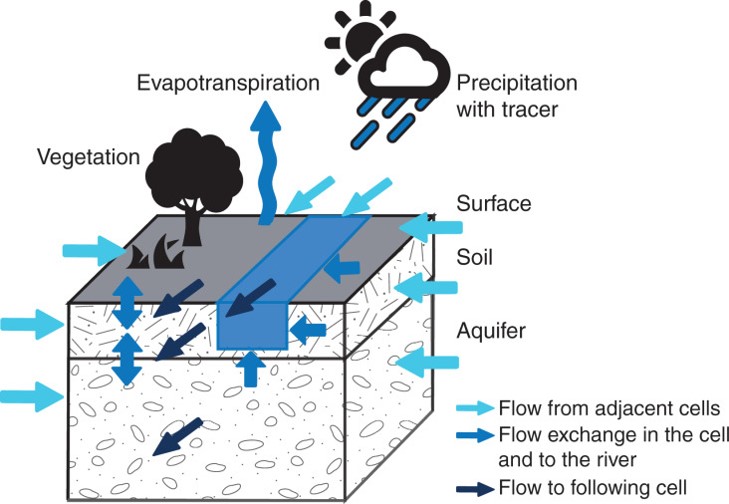Catchment Hydrology
Streamflow in rivers is determined by the interactions between hydrological processes governing the transformation of rainfall into runoff in the catchment. This includes processes of evapotranspiration, snow accumulation and melt, infiltration, groundwater recharge, etc. Catchment properties, like topography, geology, soil type and thickness, vegetation cover, also play an important role. In our research in catchment hydrology, we focused on the nature of this transformation, we developed models to simulate it, analyseed scenarios, and made engineering-focussed predictions.
Catchment water pathways and residence times

Water transit times and flow pathways are crucial elements to characterize catchment hydrologic response. Understanding their variability in space and time has impacts on water quantity and quality at the catchment scale. In this research we combined fully distributed hydrological modelling approaches with conservative tracer transport to track the paths of water parcels through catchments focussing on explaining their dynamic transit time distributions (WATET). We also conducted data-driven studies to relate catchment water pathways and storage potential to annual low flows, and made predictions of the main driving factors for low flow dynamics (LOW FLOWS).
Projects:
WATET
LOW FLOWS
Catchment runoff extremes: floods and low flows

The catchment rainfall-runoff transformation during extreme conditions leads to expectionally low or high runoff in rivers. In research on such runoff extremes, we focused on both on flood (high flow) as well as river drought (low flow) conditions. In flood research we looked at changes in flood timing and magnitudes in Switzerland and Europe from instrumental records (FLOODS) and their impacts on flood risk (FRAMEWORK). In low flow research we investigated hydroclimatic drivers of river drought timing and magnitude and their catchment conditioning from instrumental records (LOW FLOWS). Analyses of climate change impacts on floods and low flows were also analysed.
Projects:
FLOODS
FRAMEWORK
LOW FLOWS